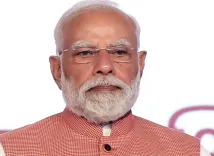Maharashtra: Central Government Initiatives Bring Change to Chhatrapati Sambhaji Nagar

Synopsis
Key Takeaways
- Pradhan Mantri Mudra Yojana supports local entrepreneurs.
- Jan Dhan Yojana empowers women with banking access.
- Garib Kalyan Anna Yojana provides essential food supplies.
- Ujjwala Yojana improves cooking conditions.
- Pradhan Mantri Awas Yojana enhances housing quality.
Chhatrapati Sambhaji Nagar, April 11 (NationPress) Numerous welfare initiatives introduced by the Central government under Prime Minister Narendra Modi are profoundly enhancing the lives of residents in Maharashtra’s Chhatrapati Sambhaji Nagar. Citizens in the area are benefiting from key programs like the Pradhan Mantri Mudra Yojana, Jan Dhan Yojana, Ujjwala Yojana, Garib Kalyan Anna Yojana, and the Pradhan Mantri Awas Yojana.
IANS talked to recipients of various initiatives from the Modi administration, who shared their challenges and how their lives have improved as a result of these schemes.
Vaishali Deepak Kadve, a local businesswoman involved in tailoring, is one such individual who has gained from the Pradhan Mantri Mudra Yojana. A few years back, she secured a loan of Rs 4.5 lakh through the scheme, enabling her to acquire sewing machines and rent a shop. Presently, Vaishali not only runs a successful business but also employs other women from her community.
"Before discovering the Mudra scheme, I was working for others. Thanks to the assistance of local social workers and without the need for bribes, I obtained the loan and established my own shop. I now receive orders from companies, and my monthly income is secure. My husband and I are managing our household well," Kadve expressed to IANS.
The Pradhan Mantri Garib Kalyan Anna Yojana has proven to be a crucial support for families like that of Bhagwat Tukaram Nikalje, a senior citizen in the area. At over 60 years old and unable to work, Nikalje depends on the free monthly supply of wheat and rice provided by the scheme.
"For the past seven years, I’ve received 10 kg of wheat and 15 kg of rice each month. Furthermore, my old-age pension is directly credited into my bank account via the Jan Dhan scheme. This assistance has enabled me to live without financial reliance on others," he stated.
The Pradhan Mantri Jan Dhan Yojana is also making a significant impact, particularly for working-class women. Many previously relied on informal savings groups or unsafe home storage methods. Now, with zero-balance accounts, ATM access, and digital banking options, they feel empowered and financially secure.
"In the past, we had to save in cash or with informal groups, which often led to conflicts. Now, we possess our own bank accounts, passbooks, and ATM cards. We can withdraw funds anytime, and government scheme payments are directly deposited into our accounts," said Nikita Rajendra, a domestic worker and beneficiary.
She noted that state-run initiatives such as the Ladki Behan Yojana also deposit benefits into her Jan Dhan account.
Ranjana Govinda, another beneficiary, expressed similar feelings and appreciated the government for making banking accessible to all, especially underprivileged women.
Another notable initiative in Chhatrapati Sambhaji Nagar is the Pradhan Mantri Awas Yojana (PMAY). Narayan Sudam Bhagwat, a washerman, endured living in a tin-roofed stone house for years, facing difficulties during the monsoon.
“Water would seep into our home whenever it rained. However, with financial support from PMAY and some of my savings, I constructed a proper house. I even established my washing shop within the same building. Importantly, I did not have to pay any bribe to receive the scheme benefits,” he shared.
Women like Usha Vilas have seen their daily life positively impacted by the Pradhan Mantri Ujjwala Yojana. Residing in New Hanuman Colony, Usha recalls the struggles of cooking using kerosene stoves or wood fires.
"I had to wait in long lines for kerosene, and when it ran out, I was left with no choice but to use firewood, which caused smoke and respiratory problems. I couldn’t even find time to take my children to school," she recounted.
"Now, with a gas connection from Ujjwala, cooking is quicker and cleaner."
Her daughter added that during the Covid-19 pandemic, the government supplied free LPG cylinders, and the subsidy program continues to assist them.
"We can even arrange for gas delivery from our mobile phone, and it gets delivered to our home," she mentioned.
The stories from Chhatrapati Sambhaji Nagar illustrate a wider trend of social empowerment, economic inclusion, and development in infrastructure driven by centrally-sponsored welfare programs. From entrepreneurship and food security to clean cooking fuel, housing, and banking access, these schemes have significantly enhanced the quality of life for many individuals.
Residents believe that the transparency and accessibility of these initiatives have restored their faith in governance. Beneficiaries noted that they received assistance without the need for bribes or dealing with bureaucratic obstacles—something they claim was unthinkable a decade ago.
For the people of Chhatrapati Sambhaji Nagar, these government programs represent not just policies on paper, but tangible changes that have uplifted their lives significantly.









